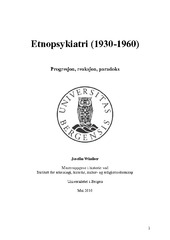| dc.contributor.author | Winther, Josefin Thorbjørnsen | |
| dc.date.accessioned | 2017-05-18T09:18:27Z | |
| dc.date.available | 2017-05-18T09:18:27Z | |
| dc.date.issued | 2011-05-16 | |
| dc.date.submitted | 2011-05-16 | eng |
| dc.identifier.uri | https://hdl.handle.net/1956/15858 | |
| dc.description.abstract | Som med alle andre deler av det britiske samfunnet, ble psykiatri importert til de afrikanske koloniene på sent 1800- og tidlig 1900-tall. De britiske legene, som reiste til kolonier som Britisk Øst-Afrika og Sør-Afrika, oppdaget et nytt felt som trengte vitenskapelig forskning - the African mind . Mellom 1930 og 1960 ble den afrikanske psyken konstruert som noe fundamentalt annerledes enn den europeiske. Innovatørene på feltet brukte begrepet etnopsykiatri til å beskrive sin forskning, og til dels sine intensjoner. Etnopsykiatri kan lokaliseres et sted mellom antropologien, psykologi og psykiatri. De behandlet afrikanske pasienter, hovedsaklig i britiske og franske kolonier, og publiserte sine nyvunnete forklaringer på den afrikanske psykens tilbakeståendhet i tidsskrift som The Journal of Mental Science. Det var i disse tidsskriftene at de også kritiserte det eksisterende kolonipsykiatriske paradigmet for å benytte seg av fordommsfulle forskningsmetoder, og å ikke ta de kulturelle faktorene i betraktning i stor nok grad. Ifølge etnopsykiaterne, krevdes det mer enn biologiske forklaringer for å forstå hvorfor afrikaneren var så annerledes. I disse årene, ble nye ideer om psyken utviklet. Men i denne kritiske perioden, karakterisert av økende kritikk av vestlig imperialisme, forlenget og utvidet også etnopsykiaterne den europeiske ideen om den afrikanske psyken som noe annet. Myter om den late, primitive, barnlige, voldelige, promiskuøse afrikaneren, ble løftet opp til et nytt statusnivå i det europeiske samfunnet - vitenskap. Den positivistiske arven fra opplysningstiden, som la vitenskapen til grunn som løsning på alle menneskelige problemer, kunne forklare hvorfor kolonipolitikken ikke bare var legitim, men nødvendig. Etnopsykiatri introduserte nye elementer til mellomkrigstidens kolonipsykiatriske diskurs, men bare til en viss grad. Den søkte nye måter å forklare, hvor metoden ble forandret, men ikke det som skulle forklares. The African mind ble ikke studert av etnopsykiaterne - den ble produsert. I denne oppgaven skal jeg belyse etnopsykiatri, gjennom å fortelle to forskjellige historier, hvor den første fokuserer på de kulturrelativistiske aspektene som fagfeltet introduserte i sine forklaringer, og den andre på de universalistiske perspektivene som ble brukt i forklaringene. Historiene har følgende titler: Etnopsykiatrien som en arena for utviklingen av nye tilnærminger til den afrikanske psyken og Etnopsykiatrien som en forlengelse av det kolonipsykiatriske paradigmet . | en_US |
| dc.description.abstract | Ethnopsychiatry (1930-1960) - Progression, reaction, paradox Like all other features of the British society, the field of psychiatry was imported to colonies in Africa in the late 19th and early 20th century. The British doctors, who travelled to colonies, like British East Africa and South-Africa, discovered a new field in need of scientific research - the African mind". Between 1930 and 1960, the mind of the African", was constructed by psychiatrists as something fundamentally different from the European. The entrepreneurs in the field coined the term ethnopsychiatry as a description of their own activities and intensions. Ethnopsychiatry can be located somewhere in the landscape between anthropology, psychology and psychiatry. They treated African patients, mainly in British and French colonies, and published their newfound explanations of the African mind" and it's backwardness" in journals, such as The Journal of Mental Science. It was in journals like these, that they also criticized the existing colonial psychiatric paradigm, for utilizing biased research methods, and not considering cultural factors to a sufficient extent. According to the ethnopsychiatrists, it took more than biological explanations to understand why the African was so different. Within these years, new ideas about the psyche were developed. But in a critical historical period, characterized by increasing criticism of Western imperialistic policy, ethnopsychiatrists also prolonged and expanded the European concept of the African. The myths about the lazy, primitive, child like, violent, promiscuous African, were elevated to a new level in the European society - science. The positivistic inheritance from the Age of reason, advocating that science was the solution to all of man's problems, could explain why colonial policy was not only legitimate, but necessary. Ethnopsychiatry represents a new element in the colonial psychiatric discourse of the inter-war-period, but to a limited extent. They sought new ways to explain, changing the methods, not the subject. The African mind" was not studied by ethnopsychiatrists; it was produced. In this thesis I seek to explain ethnopsychiatry, by telling two different stories, where the first focuses on the cultural relativistic aspects that the field introduced in their explanations, and the second focuses on the universalistic perspectives used in the explanations. The stories are titled: Ethnopsychiatry as an arena for developing new ideas and perspectives on the African mind" and Ethnopsychiatry as an extension of the existing colonial psychiatric paradigm." | en_US |
| dc.format.extent | 966999 bytes | eng |
| dc.format.mimetype | application/pdf | eng |
| dc.language.iso | nob | eng |
| dc.publisher | The University of Bergen | eng |
| dc.subject | etnopsykiatri | eng |
| dc.subject | universalisme | eng |
| dc.subject | kulturrelativisme | eng |
| dc.subject | afrika | eng |
| dc.subject | psykiatri | eng |
| dc.subject | koloni | eng |
| dc.title | Etnopsykiatri (1930-1960) Progresjon, reaksjon, paradoks | eng |
| dc.type | Master thesis | |
| dc.rights.holder | Copyright the author. All rights reserved | eng |
| dc.description.degree | Master i Historie | |
| dc.description.localcode | MAHF-HIS | |
| dc.description.localcode | HIS350 | |
| dc.subject.nus | 713107 | eng |
| fs.subjectcode | HIS350 | |
